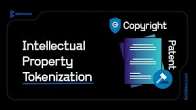IT IS YOUR MONEY
Intellectual Property as a Digital Asset Class
Intellectual property—patents, trademarks, copyrights—is being transformed into a tradable digital asset class through tokenization. Creators can monetize IP rights via blockchain, enabling fractional ownership and automated royalty distribution. From music to pharmaceuticals, this innovation unlocks liquidity and global access. Early adopters are redefining how innovation is funded and rewarded.

Tokenizing Patents, Copyrights, and Trademarks
Intellectual property (IP) is a valuable but often illiquid asset. Patents, software copyrights, music royalties, and brand trademarks generate long-term revenue but are difficult to sell or collateralize. Tokenization changes this by converting IP rights into digital tokens that represent ownership or licensing stakes.
For example, a pharmaceutical company can tokenize a patent for a new drug, selling shares to investors who receive a portion of future licensing fees. Similarly, a musician can issue tokens representing ownership in a song’s royalties, enabling fans and investors to profit from streams and sync deals.
Smart contracts automate royalty distribution, ensuring creators and investors are paid instantly and transparently.
Real-World Applications Across Industries
In music, platforms like Royal and Opulous allow artists to sell tokenized royalties. In 2023, artist Nas sold shares in his catalog to over 3,000 fans via blockchain, raising $11 million while retaining creative control.
In tech, IPwe uses blockchain to tokenize patents, enabling companies to license or trade intellectual property more efficiently. IBM has partnered with IPwe to digitize over 50,000 patents, improving valuation and transaction speed.
In pharmaceuticals, startups are exploring tokenized clinical trial data and drug patents to fund R&D. Investors gain exposure to high-risk, high-reward innovation, while researchers access non-dilutive capital.
Monetization, Liquidity, and Creator Empowerment
Tokenization empowers creators by giving them direct access to capital without surrendering full ownership. Musicians, inventors, and authors can retain control while unlocking value from their work.
Secondary markets allow IP tokens to be traded, increasing liquidity. An investor who buys a share in a patent can resell it if the technology gains traction, creating a dynamic marketplace for innovation.
Additionally, global access means a filmmaker in Kenya can license music from a composer in Sweden via tokenized rights, with payments settled instantly.
Legal and Valuation Challenges
IP tokenization faces legal complexity. Jurisdictions differ on how digital tokens relate to legal ownership of IP. Clear licensing frameworks and enforcement mechanisms are essential.
Valuation is also challenging—IP value depends on market adoption, litigation risk, and expiration dates. Reliable oracles and third-party appraisers are needed to anchor on-chain data.
As standards emerge, tokenized IP will become a cornerstone of the digital economy.
The future of innovation financing is decentralized, transparent, and inclusive. By turning ideas into investable digital assets, tokenization is unlocking the full economic potential of human creativity.
To explore how intellectual property tokenization can create new revenue streams or investment opportunities, visit DigitalAssets.Foundation and speak with experts for a FREE consultation.

More News
© 2026
